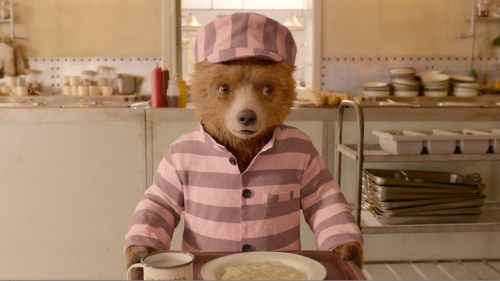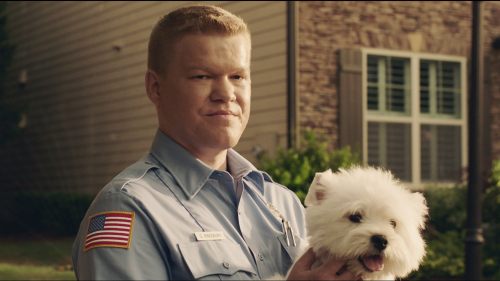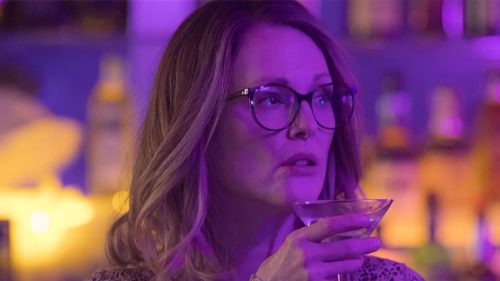GAME NIGHT Continues The Cinematic Trend Of Comedies That Are Actually Bleak Thrillers
If I had to describe Game Night in one word (and why would I? I get paid to write more, not less.) that word would be “efficient.” Feel free to put that on the poster. “Dave Schilling says Game Night is ‘efficient!’” Or don’t.
Fortunately for all of us, I have more than one word at my disposal and I will gladly use each and every one. Game Night, directed by John Francis Daley & Jonathan Goldstein—writers of Horrible Bosses and Spider-Man: Homecoming, who most recently directed the reboot of Vacation—is everything a studio comedy has to be: violent, scary, heartwarming, packed with oddball casting, and occasionally funny. Its hour-and-forty-minute runtime speeds right past you, never giving the audience much time to ponder any of its more absurd plot twists.
Swirling around the grounded lead performances of Jason Bateman as Max (Hollywood’s favorite aggrieved beta male) and Rachel McAdams as Annie is a constellation of wacky characters: the friends who come by to play board games and sip white wine in tastefully appointed suburban living rooms. Lamorne Morris and Kylie Bunbury the requisite black couple who spend the entire film bickering. Billy Magnussen plays the idiot and Catastrophe’s Sharon Horgan is his reluctant date. Kyle Chandler, an actor with a reputation for playing variations on the stern American hero type, instead plays Max’s cocky, rich brother who decides to spice up game night with an elaborate role-playing mystery game that gets out of hand. And Jesse Plemons, Chandler’s Friday Night Lights co-star, does his level best to steal the film as a socially awkward neighbor who happens to be a cop.
There’s gunplay, vehicular mayhem, and splashes of gruesome violence. The less said about the particulars of the story, the better for the prospective viewer, but at a certain point, the film quits trying to make you laugh and gives in to its greater purpose: shocking you with real stakes and emotional soliloquies. This is not to say Game Night isn’t funny at times. Plemons gets to showcase the same kind of unsettling character work he employed in the most recent season of Black Mirror. Chandler seems to relish playing an unsavory role in something that isn’t as morose as his last TV show, Bloodline. The script, by Mark Perez, does a fine job of setting up and paying off story elements and gags. Unfortunately, it’s no longer enough for a comedy to simply be funny.
If you saw David Wain’s modest, yet enjoyable Netflix biopic of National Lampoon co-creator Doug Kenney, A Futile and Stupid Gesture, you’ve probably spent at least a few minutes reevaluating your opinion of Kenney’s final cinematic output, the 1980 film Caddyshack. Throughout the final act of Gesture, Kenney, as played by Will Forte, tells anyone who will listen that Caddyshack is awful and that his career in Hollywood is over. Kenney dies before Caddyshack turns into a beloved, influential classic of American comedy. The thing is, Caddyshack is actually kind of terrible. There’s no real story, scenes lack logical transitions, its pace is lumpy and awkward, and it looks like it cost even less than the reported $6 million budget. Movies as formless and crude as that one are rarely released into theaters these days, in favor of action/comedy/horror hybrids that can compete on somewhat equal footing with tentpole comic book movies that are often funnier than films actually labeled as comedies.
One month before Caddyshack was released, a drastically different sort of comedy was released: significantly more expensive, though one equally ramshackle in its storytelling. John Landis’ The Blues Brothers was, at the time, one of the most expensive screen comedies ever. The story digressed at every available turn and ran over two hours. But, unlike Caddyshack, periodically, The Blues Brothers would break into either a song or an elaborate car chase. The action scenes might not have been played for much more than an extended gag, similar to the cheesy sequences in a Roger Moore Bond film or Smokey and the Bandit, but they still added a unique layer to the genre. This was miles away from Caddyshack, Animal House, or any other contemporary comedy film due to its gleeful melding of genres and styles.
For years, film comedies followed the Caddyshack template: cheaper, raunchier, and filled with TV stars eager to level up. A year prior, in 1979, Bill Murray had a hit with the teen summer camp escapade, Meatballs. Revenge of the Nerds, American Pie, Wedding Crashers, Kevin Smith’s work, the Farrelly Brothers’ oeuvre, and the cinematic output of countless Saturday Night Live alum all tried to be affordable and jam-packed with jokes. Action comedies like Ghostbusters and Beverly Hills Cop that made sure to offer real stakes for its protagonists were massive hits, but the vast majority of comedy films in theaters remained modest in their ambitions.
Today’s comedy film exists in a different era, one where every action blockbuster has jokes, comedy directors like the Russo Brothers are helming Marvel movies, and Jordan Peele chose to do Get Out instead of another mainstream comedy movie like Keanu and was rewarded with an Academy Award nomination. Goldstein and Daley’s Spider-Man: Homecoming script was a better approximation of the John Hughes-esque teen comedy than just about anything that’s come out in that genre in the last decade, so why bother making one without men shooting lasers at high school kids in homemade costumes or exploding airplanes? The continued influence of Marvel has a lot to do with this, but the evolution of comedy into action spectacle really started with The Hangover in 2009. The ingeniousness of that script is that it took a mundane, relatable part of life (the bacchanalian Vegas bachelor party and the inevitable morning after damage control operation) and crafted a mystery around it.
It was a massive hit and from then on, comedies increasingly relied on Blues Brothers-style action beats and subversions of everyday people, places, or things (Date Night, Bad Moms, Bad Teacher, Bad Grandpa, Dirty Grandpa, Office Christmas Party, etc.). Girls Trip and Rough Night are most analogous to The Hangover, but without the noir elements that Game Night is so influenced by. Office Christmas Party, a film about a really wild party, inexplicably includes a car chase finale through downtown Chicago.
Game Night revels in its own perceived cleverness, despite following the formula laid out by The Hangover, The Blues Brothers, and the like. There’s ominous camera work, an extended end credits gag that only works if you loved the movie, an incongruous score by action movie veteran Cliff Martinez, and the aforementioned blood-and-guts. Characters suffer bodily harm while delivering ironic one-liners ala Shane Black and known character actors waltz into frame for a few minutes just because it gets a rise out of the audience for a minute. In a sense, the presence of an actor fills in for an actual joke. Your brain is too busy registering the presence of [INSERT SERIOUS ACTOR HERE] in a comedy to realize what’s even being said. By my count, there were three separate car chases in this movie, which is not a sin by any means, but it does beg the question of whether or not this sort of genre mixing is particularly interesting anymore. If Game Night succeeds at anything, it’s that it is a very adept audition for Daley and Goldstein to direct a superhero movie rather than just write one.
Such is the natural progression for comedy directors now. Jon Favreau was a comedy director with only the kids’ movie flop Zathura on his action resume before he got a hold of Iron Man. Todd Phillips, he of the Hangover series, is set to direct a standalone Joker movie for DC Entertainment and Warner Bros. If that’s what movies like Game Night are for, expensive test job interviews funded by the major studios, then so be it. The balance of power in comedy has shifted to TV anyway. Star vehicles like Will Ferrell’s The House are not automatic blockbusters. Judd Apatow seems more interested in being James L. Brooks than John Landis or Ivan Reitman. As an actual film, Game Night can’t manage to be both funny and thrilling the way Ghostbusters or Beverly Hills Cop could. As anyone involved with Caddyshack could tell you, making a great comedy film is hard, though it’s a little easier if you can just blow up a plane instead.



